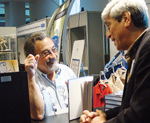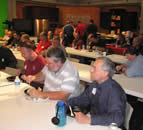SBE Certification Program
The Program of Certification is a service of the SBE contributing to the advancement of broadcast engineering for the general benefit of the entire broadcast industry. In 1975, SBE established a certification program to recognize and raise the professional status of broadcast engineers by providing standards of competence. Through the years, it has become recognized in the industry as the primary method of verifying the attainment of educational standards.
About the Certified Professional Broadcast Engineer® (CPBE®)
The Certified Professional Broadcast Engineer® (CPBE®) is the highest level of certification offered by the Society of Broadcast Engineers. Those engineers with the CPBE certification have at least 20 years of professional broadcast engineering or related technologies experience in radio and/or television, and have been previously certified on the Senior Broadcast Engineer level unless registered as a professional electrical engineer in the U.S., Canada, or any other jurisdiction with a reciprocity agreement with the U.S. Accreditation Board of Engineering Technology, Inc. (ABET).
About the Certified Senior Television Engineer (CSTE®) and
Certified Senior Radio Engineer (CSRE®)
An SBE Certified Senior Television Engineer or Certified Senior Radio Engineer must have 10 years of responsible broadcast engineering or related technology experience and must achieve a passing grade on the proficiency examination. People who have passed the CSTE® and CSRE® exams were tested on subjects related to:
- operating practices
- safety
- theory
- problems
- supervision and management
About the Certified Broadcast Networking Engineer (CBNE)
The candidate for Certified Broadcast Networking Engineer (CBNE) must have five (5) years of suitable experience in broadcast engineering or related technology and must achieve a passing grade on the proficiency examination.
Some of the general areas of emphasis on the CBNE will be:
Audio/Video over IP for Broadcast
Digital Content Management
Video Systems in an IT World
Data Transmission Systems and Practices
General PC Hardware, interconnection, and backup
About the Certified Broadcast Television Engineer (CBTE®) and
Certified Broadcast Radio Engineer (CBRE®)
An SBE Certified Broadcast Television Engineer or Certified Broadcast Radio Engineer must have five (5) years of suitable experience in broadcast engineering or related technology and must achieve a passing grade on the proficiency examination. People who have passed the CBTE® and CBRE® exams were tested on subjects related to:
- safety
- problems
- operating practices
- theory
About the Certified Audio Engineer® (CEA®) and
Certified Video Engineer® (CEV®)
An SBE Certified Audio Engineer® or Certified Video Engineer® must have five (5) years of suitable experience in audio/video engineering or related technology and must achieve a passing grade on the proficiency examination. People who have passed the CEA® and CEV® exams were tested on subjects related to:
- safety
- problems
- operating practices
- theory
About the Certified Broadcast Technologist® (CBT®)
There is no experience requirement to apply for and hold the SBE Certified Broadcast Technologist® certification. There are several ways to achieve CBT certification:
- By holding a valid FCC General Radio Telephone license or Amateur Extra license and have worked in the broadcast engineering field for at least two years.
- By achieving a "B" or better at an SBE Certified School. An SBE Certified School is a list of technical schools offering broadcast and broadcast related training.
- By achieving a passing score on the Certified Broadcast Technologist certification exam. The exam covers questions relating to:
- electronic fundamentals
- FCC rules pertaining to operating tolerances
- safety
About the Certified Broadcast Networking Technologist® (CBNT®)
This certification is designed for persons who wish to demonstrate a basic familiarity with networking hardware as utilized in business and audio/video applications in broadcast facilities. People who have passed the CBNT® exam were tested on subjects related to:
- Network topologies and layouts
- Common network protocols
- Wiring standards and practices
- Maintenance, troubleshooting and connectivity issues
- Challenges unique to broadcast-based networks
About the Certified Television Operator® (CTO®)
SBE Certification is not an FCC requirement. Nevertheless, it is evidence of an individual’s qualifications to serve as an operator at a broadcast station and will certainly be useful when seeking employment or advancement. Each radio and television station has its own policies and procedures, and many have a written station manual. However, the FCC Rules and basic operator procedures apply to all stations.
A CTO® has been tested on information that includes practical information on the Emergency Alert System, FAA tower lighting, remote control operation, FCC power levels, program sources, ingesting, Children's Television time restrictions and more. It contains information on how TV facilities work, operating the station, the duties of master control operators and maintaining the station logs. It explains the digital signal path as programming passes through typical equipment found in a modern digital master control.
About the Certified Radio Operator® (CRO®)
SBE Certification is not an FCC requirement. Nevertheless, it is evidence of an individual’s qualifications to serve as an operator at a broadcast station and will certainly be useful when seeking employment or advancement. Each radio and television station has its own policies and procedures, and many have a written station manual. However, the FCC Rules and basic operator procedures apply to all stations.
A CRO® has been tested on information that includes FCC rules, technical layout at a typical station and station operations. Topics include audio mixing consoles, microphones, computerized recording systems, telephone-interface equipment, audio patching and routing, equalizers, headphones, transmitter remote control systems, audio processors, satellite systems and program-audio delay equipment as well as the general responsibilities of a radio operator. In addition, an overview of station management structure and professional etiquette is presented. CROs are also tested on station logs, the Emergency Alert System (EAS), safety requirements and operational procedures for trouble situations.
About the 8-VSB Specialist (8-VSB)
To establish a benchmark of individual strengths, the National Certification Committee created the concept of specialist certifications. An SBE 8-VSB Specialist must first hold certification on the broadcast engineer, senior broadcast engineer or professional broadcast engineer certification level and pass the proficiency exam.
An 8-VSB Specialist certification exam covers areas of competency in: transport stream, audio (AC-3), video (MPEG-2), PSIP, DTV standards documents and transmission systems.
About the AM Directional Specialist (AMD)
To establish a benchmark of individual strengths, the National Certification Committee created the concept of specialist certifications. An SBE AM Directional Specialist must first hold certification on the broadcast engineer, senior broadcast engineer or professional broadcast engineer certification level and pass the proficiency exam.
An AM Directional Specialist certification exam covers areas of competency in: the operation, maintenance and repair of a directional antenna system.
About the Digital Radio Broadcast Specialist (DRB)
To establish a benchmark of individual strengths, the National Certification Committee created the concept of specialist certifications. An SBE Digital Radio Broadcast Specialist must first hold certification on the broadcast engineer, senior broadcast engineer or professional broadcast engineer certification level and pass the proficiency exam.
An Digital Radio Broadcast Specialist certification exam covers areas of competency in: knowledge of importers, exporters, the various methods of combining analog and digital transmitters to antenna systems, delivery of digital audio signals and data to transmitter sites, transmitter emission mask measurements, AM and FM FCC rules, monitoring of digital signals and bandwidth requirements for AM antenna systems.
About the SBE
The Society of Broadcast Engineers (SBE) is the only organization devoted to the advancement of all levels and types of broadcast engineering.
With more than 5,200 members and 115 local chapters, the SBE provides a forum for the exchange of ideas and the sharing of information to help you keep pace with our rapidly changing industry. The SBE amplifies the voices of broadcast engineers by validating your skills with professional certification, by offering educational opportunities to maintain and expand those skills and by speaking out on technical regulatory issues that affect how you work.
All this adds up to keeping you at the top of your field, enhancing your value to your employer, or if you are self-employed, preparing you to meet the changing needs of your clients.
Who are members of the SBE?
The SBE, a non-profit professional organization formed in 1964, is committed to serving broadcast engineers no matter where in the world you work. From the studio operator to the maintenance engineer and the chief engineer to the vice president of engineering, SBE members come from commercial and non-commercial radio and television stations and cable facilities. A growing segment of members are engaging the industry on their own as consultants and contractors. Field and sales engineers and engineers from recording studios, schools, production houses, CCTV, corporate audio-visual departments and other facilities are also members ofthe SBE.









